RIGHTS RESPECTING and US
Our school came into being on September 1 2014.
Everyone involved with the school at that time had their own vision but when drawing up the school Code all agreed that we wanted everyone to be Gentle, Fair, Generous, Well mannered, Hardworking and Honest. These attributes are interwoven through everything we do in St. Clare’s Abbey Primary School. They are at the core; and our constant focus in putting children at the forefront, heart and culmination of any and all our decision making is overriding.
Therefore, based on our strong foundations we wanted to embed children’s rights into our ethos, culture, policies and daily practice.
We applied for Rights Respecting status because in doing so we would be putting the United Nations Convention on the Rights of the Child (UNCRC) at the heart of our planning, policies, practice and ethos and very importantly we would unequivocally give all our children a voice and a platform so that they could express their opinions.
A Rights respecting school not only teaches about children’s rights but also models rights and respect in all its relationships: between staff and pupils, between staff and staff and between pupils.
RRSA is based on principles of equality, dignity, respect non-discrimination and participation.
To find out more about the Rights Respecting Schools Award please visit: http://www.unicef.org.uk/rrsa
Recognition of Commitment
After registering our school, the first stage of the RRSA was obtaining the Recognition of Commitment (ROC). The RRSA was introduced initially to the school community – staff, pupils, governors, parents and to the wider community.
A steering group composing of adults and children was formed to guide, promote and develop the Rights Respecting initiative throughout the school. Procedures were put in place for monitoring the impact of the initiative.
One of the first undertakings we the Steering Group did was to create a mascot. We wanted a mascot that would draw the interest and ignite the curiosity of all the staff, parents and most importantly the pupils.
Our mascot had to be child friendly, had to impress the pupils, have the ability to communicate the Articles and generate positivity.
A sub-committee made up with pupil members of the Steering Group and led by Mrs Sloan worked on this challenge.
After a number of sessions they came up with our mascot,
‘Pop the Peacock’…
They finished it off with a matching slogan, ‘Rights for all…’
In January 2018 we were delighted to receive our RRSA Recognition of Commitment (ROC) status.
Going Forward
During this academic year 2018 - 2019, we will be working towards achieving Level 1.
The RRSA steering group have been busy planning events to help children recognize their rights and responsibilities, both in school and beyond.
We are extremely proud of our children, staff and school. We hope that you will continue to support us on our Rights Respecting journey.
RR Steering Group
Our Rights Respecting Steering Group has a very important role in raising awareness of the UNCRC (United Nations Convention on the Rights of the Child) and promoting the awareness of children’s rights in St. Clare’s Abbey.
In our Steering Group meetings, all members work hard to ensure that UNCRC Article 12 ‘You have a right to give your opinion, and for adults to listen and take it seriousl ’ is always top of our agenda.
By working together, we seek to ensure that all stakeholders have an opportunity to have their views heard and grow in confidence and knowledge when discussing the UNCRC and its impact on our daily lives. We work closely with our School Council, Anti Bullying Ambassadors, ECO committee and Digital leaders to strengthen the voices of children both inside and outside school
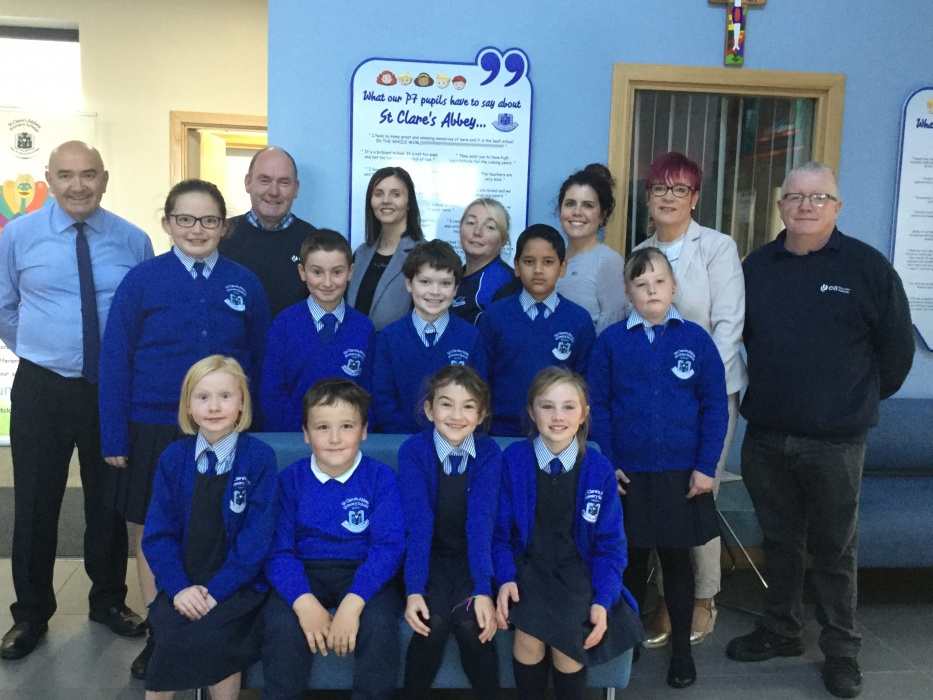
Our New Primary One's
As we welcome our new Nursery and Primary 1 children as well as new pupils within our school community we are reminded of Article 28, that every child has to an education.
Having A Say
Each class in the school have had the chance to have a say in their own class rules, they have looked at Article 12 every child has the right to have a say in all matters affecting them, and to have their views taken seriously.
Our Class Charters
We have all produced our own class charters.
Have a look at the amazing displays around our school.
Article 1
Everyone under the age of 18 has all the rights in the convention.
Keeping Fit and Healthy
Well done to Mr Digney who along with Healthy Kidz organized a wonderful day on how to keep active. They put all our boys and girls and staff members through their paces. During assembly they told us of the importance of health care and nutritious food in order to stay healthy. (Article 24)
Many pupils from P1 to P7 shared their experiences of joining groups and clubs in order to stay active such as Camogie, Football, Irish Dancing, Karate and much more. The pupils then enjoyed a full day fitness marathon supervised by Healthy Kidz and enjoyed healthy, nutritious fruit provided by Neighbourhood Renewal.
This big workout helped raise vital funds to help us promote healthy lifestyles and encourage positive eating habits. (Article 31)
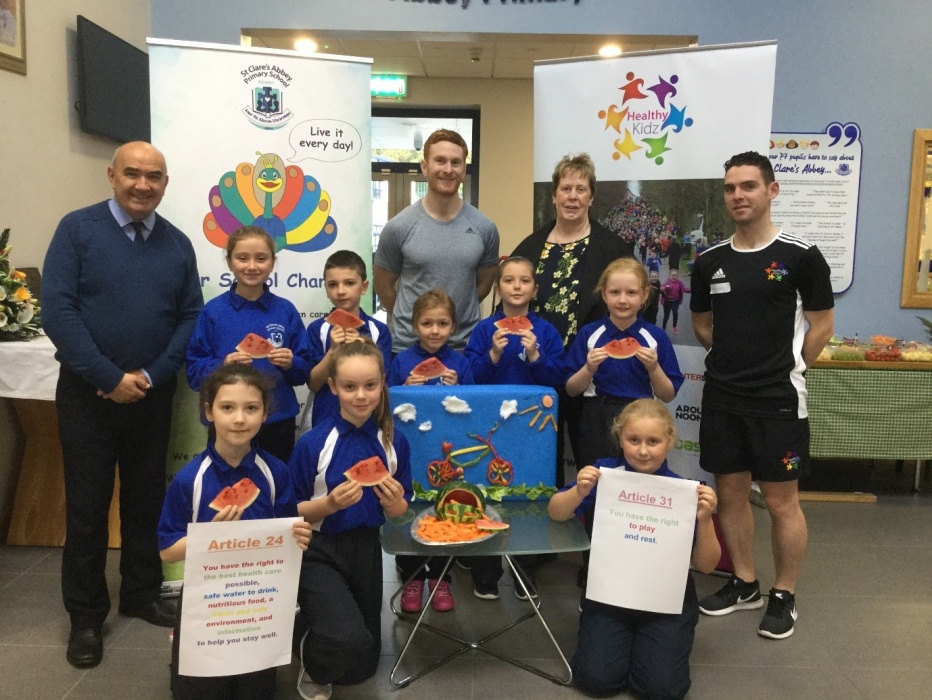
Donation to Southern Area Hospice Services
October 8 2018
We Have a Right to be Alive
Miss Amy Mc Keown from Southern Area Hospice Services received a cheque from members of the School Council. At the beginning of every year the Council members choose which charities they are going to help and then organise fund raisers. The Steering Group with the help of the School Council used this visit to highlight Articles 6 and 24 of the UNCRC.
Each class discussed the important role hospitals, doctors, nurses and other health care workers play in our lives; the reasons why our school insists on our snack being fruit or vegetables; the reason why chips are only served on one day per week in the Dining Hall. Everyone agreed that we all have a RESPONSIBILITY to live healthy lives and not become unwell because of a bad diet or lack of exercise.
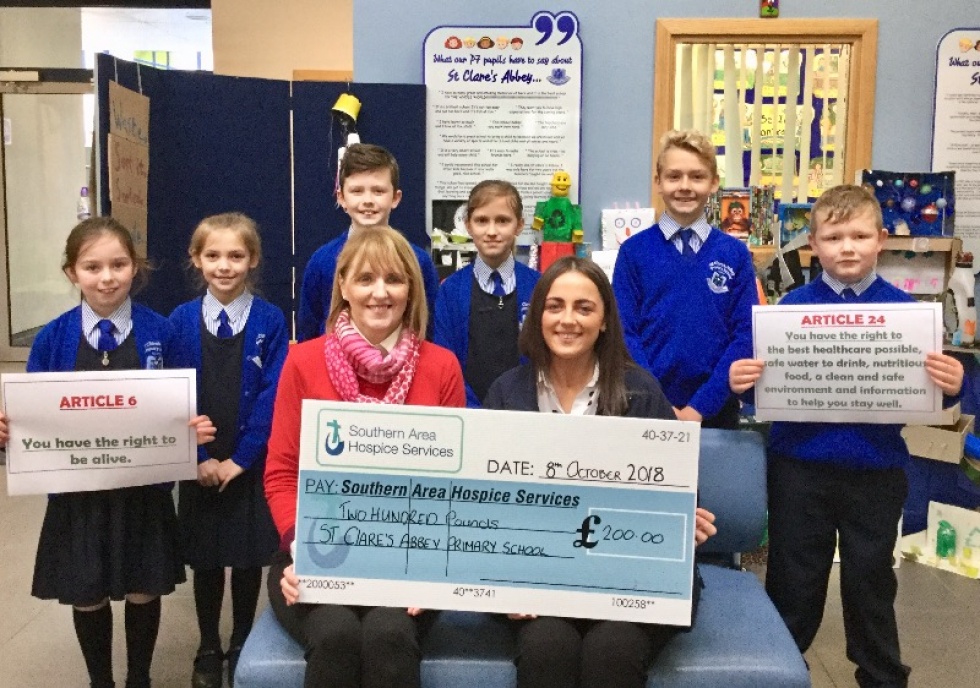
Article 24 states that every child has the right to the best possible health, safe water to drink, nutritious food, a clean and safe environment and information to help you stay well.
Nurses Julie Laverty and Kathleen Mc Ateer from The National Health Service visited KS2 pupils on October 18 to talk about Healthy Living and also to give the boys and girls their Flu Vaccine.
Each year, viruses that are most likely to cause flu are identified in advance and the World Health Organization (WHO) recommends which type of flu virus strains to include in the vaccine. This is one of the ways that the government ensures that our health is being looked after.
The nurses discussed the importance of daily exercise, eating the recommended portions of fruit and vegetables, eating a healthy breakfast, drinking 6-8 glasses of water a day and getting 10 hours sleep each night.
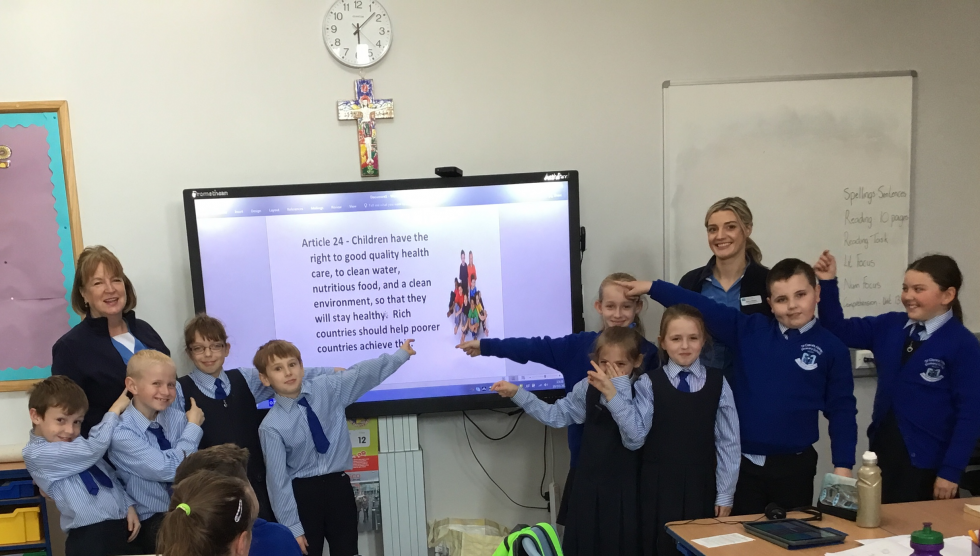
We have the right to the best…
October 29 2018
Our school teamed up with STATSports to try out the latest performance monitoring devices used by elite sports teams. These are worn by athletes during practice games and matches to collect intricate data on their performance and physical wellbeing.
Teams in the English Premier League, La Liga, the NFL, NBA and other professional sporting leagues use STATSports’ performance trackers to gather and analyse real-time player and team data during training and games to help them improve performance, strategy and reduce injuries.
We enjoyed learning about the cutting edge technology and sport science which has changed the way elite sport is played, coached, measured and analysed.
Articles 31 and 24 help ensure we are part of the FUTURE!!!!!!
Pictured are Primary 7 pupils with Stephen Bradley from STATSports using specialised equipment to enhance performance and improve physical wellbeing.
Anti - Bullying Week 2018
This week all children from Nursery through to Year 7 were involved in the school's Anti-Bullying Programme; looking at how St. Clare’s Abbey can continue to provide a safe and happy place to learn where all the children feel secure.
All classes studied and discussed Articles 15 and 19 and agreed that everyone has a responsibility to make sure children experience their rights as well as making rights a reality.
Fantastic Anti- Bullying posters were produced by pupils in all year groups sending a clear message that Bullying is not tolerated in our school.
The week culminated in an assembly led by a collaboration of the Anti- Bullying Ambassadors, UNICEF Rights Respecting School Pupil Steering Group and Digital Leaders. The assembly gave children an opportunity to listen and learn from their peers on the various types of bullying, what pupils should do if they feel they are being bullied and what they can do to stop it. The Anti-Bullying Ambassadors, the Rights Resting Steering Group and Digital Leaders all spoke passionately and reinforced their message with two videos on Bullying.
https://www.youtube.com/watch?v=ybwC6vQ0nY0
https://www.youtube.com/watch?v=S03Br1dwJR8
This week was very important, but at St. Clare’s Abbey we know that we are all against bullying every week.
All agreed we must 'Stamp Out Bullying' for good.
Christmas and Advent Around the World
We have in our school many children whose parents have come to Ireland in search of a new and better life. These boys and girls along with their parents have enriched and opened our minds to countries which for many seemed to be on the other side of the world. Quite a number of these parents were quite keen to share with everyone their Christmas and Advent Traditions. So the Rights Respecting Steering Group organised a ‘Christmas and Advent Around the World’ event in school with the focus on Articles 14 and 30.
Article 14
You have the right to choose your own religion
and beliefs. Your parents should help you decide
what is right and wrong,
and what is best for you.
Article 30
You have the right to practice your own culture,
language and religion - or any you choose.
Minority and indigenous groups need special
protection of this right.
It was a brilliant event! The boys and girls enjoyed learning about the various traditions that take place in so many children’s homes prior to Christmas. They enjoyed sampling the many varieties of food that are enjoyed by so many of their friends. Our parents from Poland, Lithuania, Latvia, Slovakia, Italy, Philippines, Bangladesh, Russia, China, Germany, USA, Canada, Israel, Brazil, Moldova and of course Ireland went to great lengths to ensure that the Christmas and Advent traditions of their home country were proudly displayed. Some parents sent in traditional costumes which are worn over the Christmas season.
December 2018
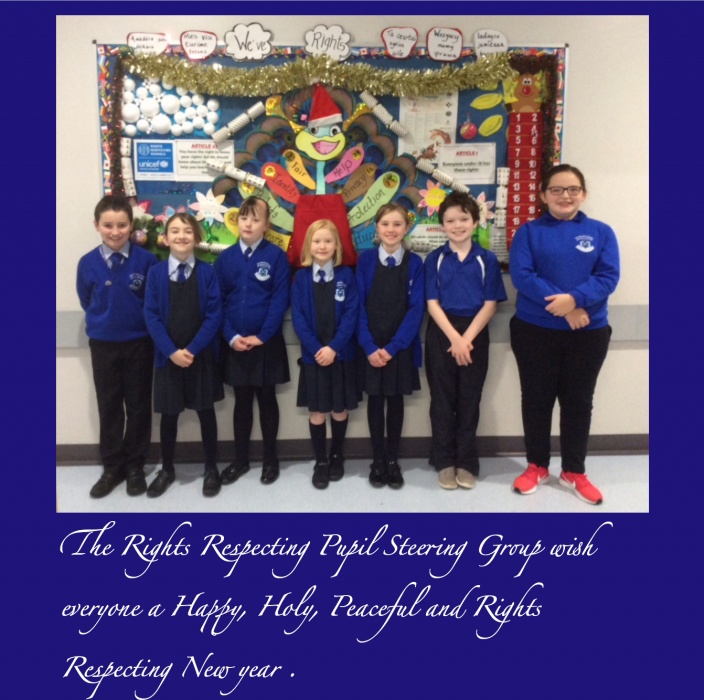
St Clare's Abbey Shoe Box Appeal For The Homeless
Homelessness
Why is having a home so important?
We believe that having a place to call home is the most fundamental of human rights.
‘Home’ is a powerful word. It means many things to many people. At its most basic, we believe that the word ‘home’ means a safe and secure place where you can truly be yourself.
We all take having a home for granted. But imagine if you woke up tomorrow to the news that you’d lost your home. What would you do? Where would you go? What would it mean for your job? What would it mean for your children’s schooling?
Imagine not having a say in when you’d like to go to sleep. Imagine not having cooking facilities. When you don’t have a home, every mundane, routine aspect of your day becomes another hurdle to overcome. And now imagine you have a young family to look after, and you’re in nightmare territory.
The right to housing is recognized by the United Nations (Article 25 in the Universal Declaration of Human Rights) and the UN has been active in highlighting homelessness as a violation of human rights.
Homelessness has been a long-running problem in Ireland, despite numerous pledges from politicians to tackle the crisis. Every night many are forced to sleep rough on the streets, especially in Dublin, Belfast and even in our own town of Newry because they can't find a suitable bed for the night. Listen to some of the personal stories from the homeless.
http://homelessnessinireland.ie/personal-stories-3/
The UNICEF Rights Respecting Steering Group agreed that there was a strong link between Article 27 and the issue of homelessness. They had no hesitation in agreeing to promote and support local homeless people through the Newry Helping the Homeless (NHTH) Christmas Shoe Box Appeal.
Article 27
You have the right to food, clothing, a safe
place to live and to have your basic needs met.
You should not be disadvantaged so that you
can't do many of the things other kids can do.
The shoe boxes were designed to help those living on the street and in order that the boxes contained a variety of necessities each class was requested to bring in a particular item.
P1/P2 pupils brought in crisps and biscuits; P3 pupils brought in cans and bottles of soft drinks; P4 pupils brought in tins of food; P5 + ECPD pupils brought in sweets; P6 pupils brought in hygiene products; P7 pupils brought in items of clothing.
The response from our parents and pupils was amazing. The UNICEF Rights Respecting Steering Group were able to fill over 100 Shoe boxes which were collected, dispatched and delivered to the needy by Newry Helping the Homeless.
Support For The Hospice At Christmas
We Have the Right to Life
Mr John Dalzell, an ambassador and a treasured volunteer for Southern Area Hospice has devoted 27 years to sitting out on Hill Street Newry raising much needed funds. Members of the Rights Respecting Steering Group visited John’s Trailer during the duration of his Sit Out to offer their support and to highlight Article 6. John was very appreciative of the support and has promised to come to visit the school in the new year to talk to the children about the Hospice and his work.
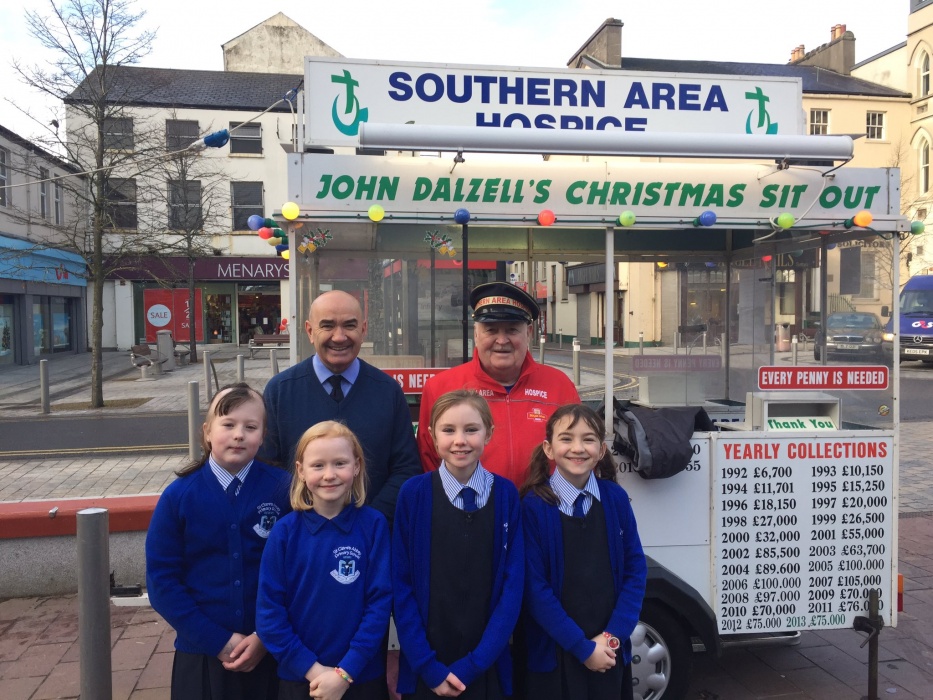
Global Learning
Rights for Everyone
Article 1
Everyone under 18 has these rights.
Article 2
All children have these rights, no matter who
they are, where they live, what their parents do,
what language they speak, what their religion is,
whether they are a boy or girl, what their culture
is, whether they have a disability, whether they
are rich or poor. No child should be treated
unfairly on any basis.
Miss Katie Mc Ardle, a past pupil and third-year student in Trinity College Dublin led an Assembly as part of our Global Learning Curriculum. She recently visited India through her voluntary work with Suas.
Suas is an Irish Charity that works both in Ireland and Internationally (India, Kenya and Zambia) in deprived areas. Suas believes that through literacy change is possible.
Katie went to Kolkata, India for 11 weeks during the summer of 2018 (June-Sept). She worked with a partner organisation of Suas in Kolkata called the Thoughtshop Foundation.
She worked in Youth Resources Cells (YRCs) along with her team of 9 others. The YRCs work with children in rural and urban communities in Kolkata. The Youth Resource Cells provide sustained holistic support and protection against child trafficking, abuse, child marriage as well as instilling values of gender equality and inclusion. The Thoughtshop focuses on social issues such as Children’s Rights, Youth Issues, Reproductive Health, HIV/AIDS, Gender Equity and Adolescent Health.
The pupils of St Clare’s Abbey Primary School helped Katie raise £2,995 putting into action Article 28 ‘richer countries helping poorer countries’. She showed the pupils photographs of life in India and described vividly the conditions that children experience every day. Katie then challenged our children to compare their lives with the lives of the children from India.
Edmund Rice Awards 2019
Twelve P7 boys and girls from St Clare’s Abbey travelled to Dromantine to celebrate their participation in the Edmund Rice Awards Project. This project was established in 1994 to encourage young people to respond to the needs of their local community in the spirit of Edmund Rice.
The project encourages students to serve their local community and exposes them to the realities of social injustice and marginalization. It provides a rare opportunity for young people to make a significant difference to the lives of local community members. The project involves reflection sessions to be conducted in school and provides the opportunity for students to assess their own voluntary work.
This year we travelled to celebrate the tenth Anniversary of the Edmund Rice Schools Trust. We were joined by Christian Brothers Primary School, Armagh; Christian Brothers Grammar School, Omagh; Abbey Christian Brothers Grammar School, Newry; St Mary’s Christian Brothers Grammar School, Belfast; Edmund Rice College, Glengormly; Christian Brothers School Glen Road, Belfast; St Patrick’s Primary School, Belfast and John Paul 11 Primary School, Belfast.
The Edmund Rice family of schools come together annually to celebrate their achievements in fulfilling the vision of Blessed Edmund Rice. The Edmund Rice Schools Trust Charter (ERST Charter) defines these schools in the following way;
“The hallmarks of an Edmund Rice school are care, especially for those who are vulnerable or disadvantaged in any way, and action for social and ecological justice.”
To this aim, the awards ceremony highlights and celebrates the many projects undertaken in the schools each year to help others.
The day began with contributions from Professor Peter Finn and Brother Edmund Garvey. Following this, each school including St. Clare’s Abbey delivered presentations on how Edmund Rice’s vision influenced them in the many projects and initiatives they undertook over the year to assist those in need.
St. Clare’s Abbey cited the United Nations Convention on the Rights of the Child listing the forty two rights made to children and young people so that all are treated fairly and equally.
Their presentation focused on how children in St. Clare’s Abbey exercise their Rights which they are born with and don’t have to be earned. They highlighted the support given to fellow pupils, how pupils care for the homeless at Christmas, how the ECO Council are changing attitudes and actively promote respect and care for the environment to raising money for many worthwhile charities who stand in solidarity with those who are powerless and marginalised.
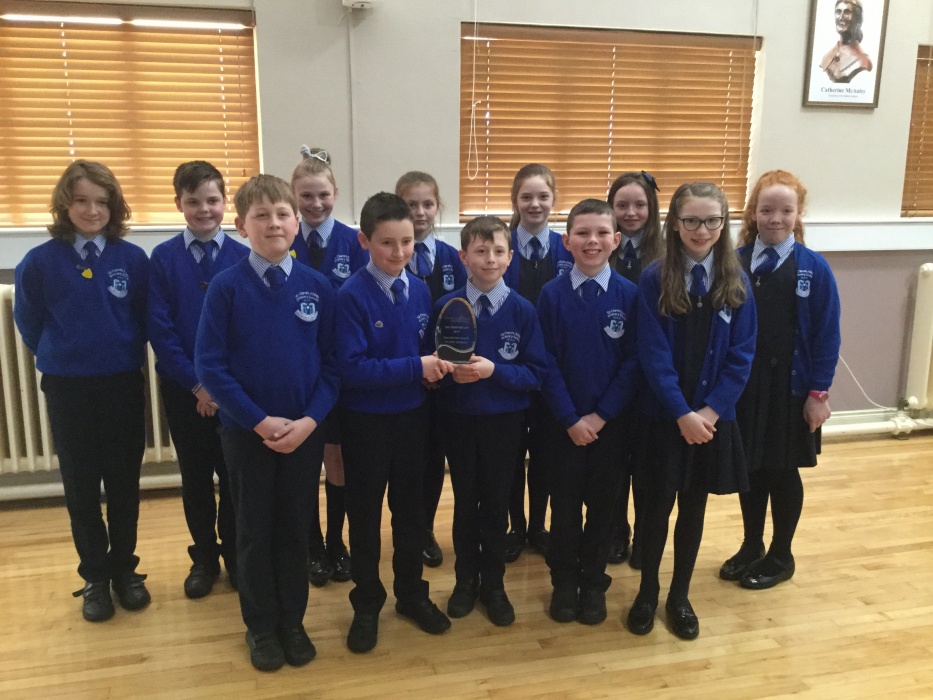
Celebrating St Patrick's Day 2019
Enjoying Article 7
You have the right to a name, and this should be
officially recognized by the government. You have
the right to a nationality (to belong to a country).
The boys and girls of St. Clare’s Abbey Primary School enjoying St. Patrick’s Day celebrations in school.
World Down Syndrome Day
Article 29
The propose of education is to develop
every child's personality, talents
and mental and physical abilities.
St Clare's Abbey celebrated World Down Syndrome day on Thursday 21st March.
The campaign this year was ' Lots of Socks.'
The significance of the date -21st day of the 3rd month is that a person with Down Syndrome has an extra 21st chromosome- 3 instead of 2.
The significance of the socks is that we explain to our children that a chromosome is shaped like a little sock.
We therefore asked everyone to wear odd socks, the crazier the better.
We are very lucky to have a beautiful little girl in our school who has Down Syndrome and her Mummy made a video presentation explaining Down Syndrome in a very child friendly way. The video was shared with the whole school in our Friday assembly.
The amazing video below was made by Miss Mallon's Primary two class.
Hygiene Assembly
We must keep ourselves clean and tidy!!!!!
Article 24 tells us:
You have the right to the best health care possible,
safe water to drink, nutritious food, a
clean and safe environment,
and information
to help you stay well.
Our rights are unconditional but we too have to play our part!
Mrs Claire Eaton (Paediatric Nurse) led an Assembly on Personal Hygiene and give a lot of good advice. She spoke about having good hygiene habits! Keeping yourself clean and tidy is very important, especially as you are growing up. It will make you look better, smell better and it can even stop you getting ill.
She suggested these 5 top tips to keep us looking and feeling our best.
Phew! What's that smell?
1. Take a bath or shower
Every kid sweats, but as you start to get older you may find your sweat starts to smell. This sweaty smell is called Body Odour and it is caused when sweat reacts with bacteria on your skin, especially in places such as your armpits and your feet.
The best way to get rid of Body Odour is to take a bath or shower every day. You should use a mild soap or shower gel and warm water to wash your body all over to get rid of any bacteria and dirt.
If you sweat a lot or play a lot of sport you may want to wear a scented deodorant which you spray or roll on your under arms in the morning to kill bacteria. However a deodorant is no substitute for clean skin so make sure you are clean before you put it on.
2. Wear Clean Clothes
There's no point putting dirty clothes on a clean body! First of all, make sure you change your underwear and socks every single day. Some items of clothing you may be able to wear a couple of times before they need washing such as trousers or jumpers but anything that is dirty or smelly should be put in the washing basket.
3. Take Care of Your Hair
Your scalp produces oil and sweat which sticks to your hair so you need to wash it regularly to stop it getting dirty and greasy. To wash your hair you need to wet it and squirt a little bit of shampoo in the palm of your hand. Rub the shampoo into your scalp using your finger tips to loosen the dirt before rinsing it out. If you have long hair you may need to use a conditioner which will make it easier to brush out the tangles.
How often you need to wash your hair will depend on what activities you have been doing and how quickly your hair gets greasy.
4. Brush Your Teeth
It's very important to keep your teeth clean. If you don't brush your teeth twice a day you might end up with rotten teeth, gum disease and bad breath.
5. Wash Your Hands
You should wash your hands with soap and warm water before eating or touching food and after handling pets or going to the toilet as it will kill germs that could make you ill.
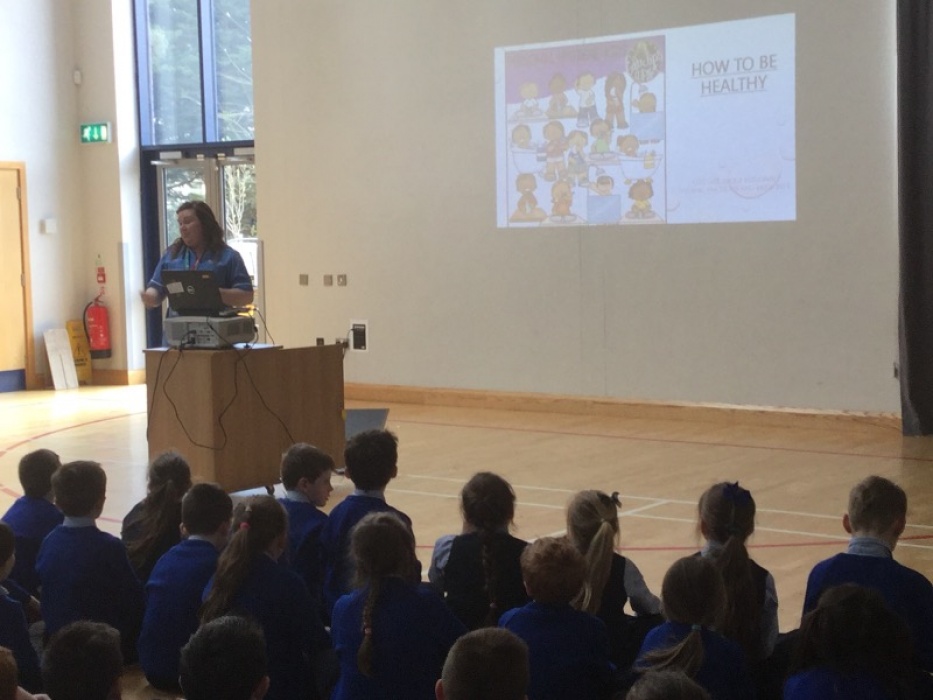
Road Safety Awareness
Article 6
‘You have the right to be alive’
Rita Bently and Mary Kate Mc Kevitt from Road Safe NI led our Road Safety Assembly. Rita whose husband was killed in a road accident and Mary Kate who works for the Northern Ireland Fire and Rescue Service spoke passionately about Road Safety and delivered very important advice to children and staff. They also send this advice to parents…
Road safety for seven to 11 year olds
At seven years old, your child might still hold your hand as you walk them to school - a few years later your child may be going to school without you. It's important to know ways your child can be independent while staying safe on the roads.
Knowing the Green Cross Code
Children should not go out alone until they are old enough to know the Green Cross Code and use it properly. The age is different for all children but it is generally not before they are eight years old.
To follow the code, they must:
- find a safe place to cross
- stand on the pavement near the kerb
- look all round for traffic and listen
- if traffic is coming - let it pass then look all round again
- when there is no traffic near, walk straight across the road
- keep looking and listening for traffic while crossing
When walking along the road
Walking is healthier than going by car. But your child can't always see what you can see and drivers can't always see your child, where they can see you. You could teach your child to:
- always walk on the pavement or path if there is one - never stray on to the road
- walk as far away from the kerb as possible
- walk in single file on the right side of the road facing the traffic if there's no pavement
When you are out and about
Always be sure to:
- explain road safety rules
- use the Green Cross Code
- talk about what's going on in the street
- encourage your child to talk about what they see on the roads and whether it's safe or not
- let your child make decisions with you, so that they learn through activity
- help your child plan the safest route whenever they are going somewhere
Using crossings
Teach your child to:
- always use the Green Cross Code
- wait at the kerb by the crossing so that drivers know they want to cross
- at a signal crossing, press the button and wait for the green man to light up and never walk out while the red man is showing, even if the cars have stopped or other people are crossing
- always walk over the actual black and white stripes of a crossing - many accidents happen around crossings
- never cross the road while using their mobile phone or while listening to music on head phones
- stay alert at all times, remember cyclists and motorcyclists use the roads as well as drivers
- where there is an island
Bus safety
Make sure your child knows:
- to stop, look and listen before they cross any road
- that they should stay on the footpath or the verge until the bus has moved far away
- to act sensibly on and around school buses
- about the dangers of traffic being hidden from their view by the school bus
- never to cross the road in front of the bus
As a parent or child's guardian, you have responsibilities for their safety.
Please watch this Youtube video with your children. It may save them from serious injury or death.
https://www.youtube.com/watch?v=-HlOJqqL56U
Remember !!!
Article 6
‘You have the right to be alive’
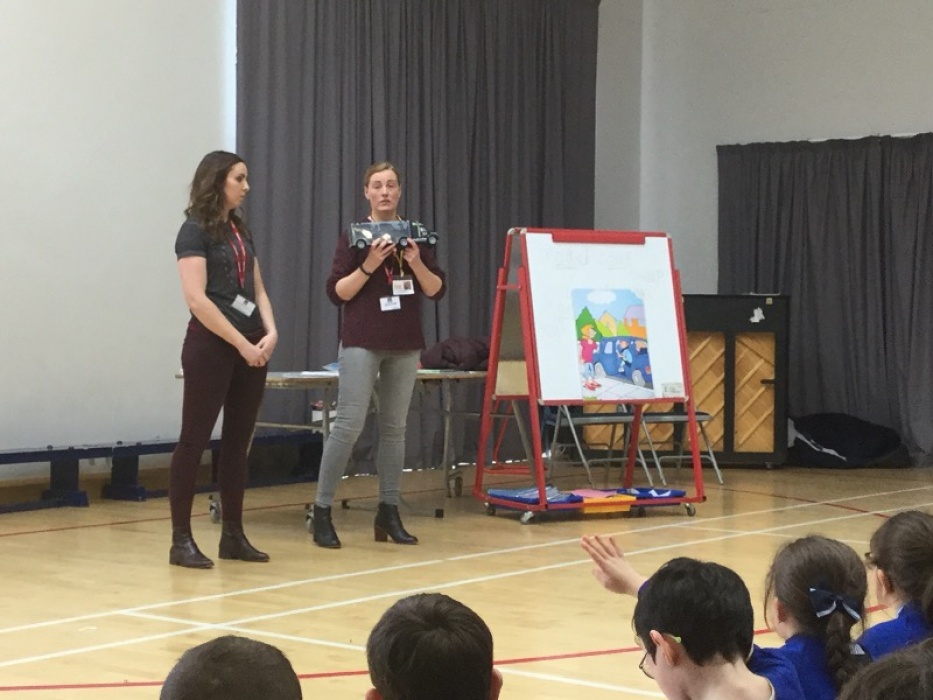
Fairtrade Fortnight
Article 32
‘You have the right to protection from work that
harms you, and is bad for your health and education.
If you work, you have the right to be
safe and paid fairly’
What is Fairtrade?
What is it all about?
Fairtrade is about better prices, decent working conditions, local sustainability, and fair terms of trade for farmers and workers in the developing world. By requiring companies to pay sustainable prices (which must never fall lower than the market price), Fairtrade addresses the injustices of conventional trade, which traditionally discriminates against the poorest, weakest producers. It enables them to improve their position and have more control over their lives.
With Fairtrade you have the power to change the world every day. With simple shopping choices you can get farmers a better deal. And that means they can make their own decisions, control their future and lead the dignified life everyone deserves.
How is fair trade different to normal trade?
Unfortunately, in the standard trade process, the producer (e.g. the farmer or craftsmen) is often under-paid for their product. This leaves them unable to survive, as the cost of production and materials are more than what they receive. Ultimately they do not have enough money to live off or support their own families.
The conditions to which the workers are exposed are often also unfair. They are given few or no workers’ rights, and are forced to work long hours with no access to facilities, such as running water or toilets.
As part of our work on Fairtrade the Eco Council held a Fairtrade hot chocolate morning for the pupils in our school. We all enjoyed some Fairtrade chocolate as well as other Fairtrade snacks such as bananas and sugar. We had great fun and we all hope that our parents and our fellow pupils will now look out for the Fairtrade logo when they are doing their shopping.
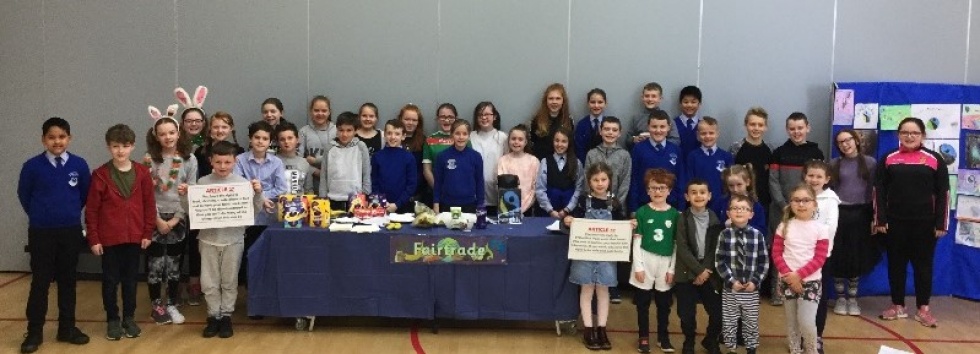
Rights Respecting Newsletter Spring 2019
Colouring Competition Winners
RIGHTS RESPECTING ‘POP THE PEACOCK’
COLOUR IN COMPETITION Easter 2019
WINNERS
Nursery - Dean Carr
ECPD - Micco Pereira
Primary 1- Roise McCoy – Mrs Gallagher
Primary 2- Ellen Larkin - Miss Friel
Primary 3 -Jenna Dolinska – Miss Rocks
Primary 4- Eimear Treanor – Mr Clarke
Primary 5- Laura Ludwa – Mr Hillen
Primary 6- Eoin Gorman – Mrs A McParland
Primary 7- Julia Kielczykowska – Mrs M McParland
Friends of Africa
Mr. Barry Traynor and Mr. Gerry Keenan from Friends of Africa visited the school to update the boys and girls on their work and also to thank them for their support for the Street Children Project in Kitwe, Zambia.
Friends of Africa work alongside a local charity, Friends of the Street Children (FSC), to provide support and care to street kids in Kitwe. There are three main programmes designed to respond to the needs of the children in FSC - Street Outreach, Rehabilitation and Reintegration. In some cases, children have been happily reintegrated into family life. Many children however, are unable to return home and they receive care and rehabilitation in the Friends of the Street Children shelter. At the shelter the children attended classes, play sport and learn skills that will help them to live on their own or reintegrate with their families. The short-term volunteers spend their days here at the shelter, teaching the children, helping out with chores such as tending to the vegetable gardens and they also spend time playing sports and other games with them.
They explained that they used some of the fundraising money to plant vegetables in the garden at Chibusu which now gives the children fresh vegetables all year round. There has also been a project set up to breed chickens and rabbits so that they can be sold in the local markets. The profit from these sales goes back into the shelters to be used directly for the children.
They have been able to purchase medicine and first aid supplies to treat children on the streets and in the project. The shelters have had repairs carried out and are now much safer for the children to live in.
Mr. Traynor and Mr. Keenan also informed the children that the support given by St. Clare’s Abbey give them the opportunity to go out as a team on the streets during the day and at night to find vulnerable children and to remove them to the safety of the shelters.
The best way they said to describe the impact made by St. Clare’s Abbey in Kitwe is that there are children alive and well today thanks to their love and support. They have given the rarest of things to children in Zambia, HOPE.
Mr. Traynor and Mr. Keenan then presented the school with a painting of an African Landscape by a Street Child. This young person was saved at the age of three and is now eighteen years old with a bright future ahead of him.











Silver Award June 2019
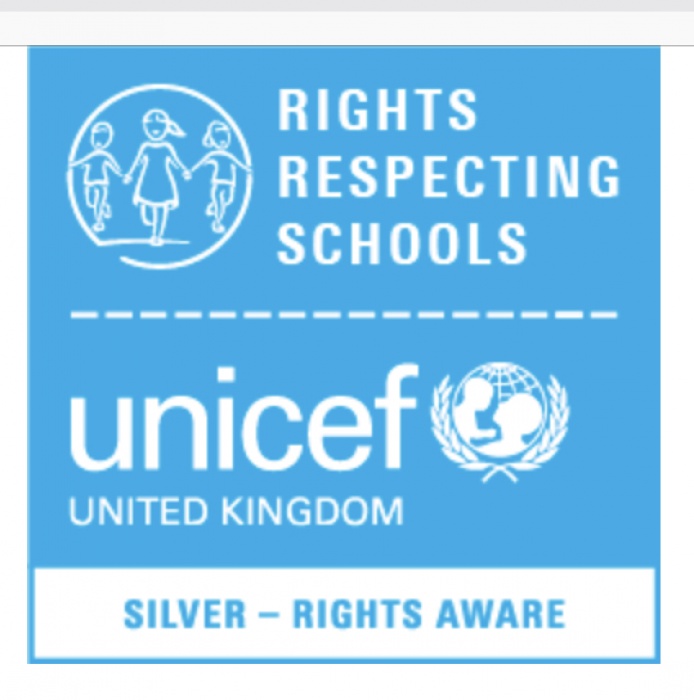
Going for Gold in 2020
During this academic year 2019-2020, we will be working towards achieving Level 2 which is Gold Status.
The RRSA steering group will be working throughout the year with all pupil representative bodies and planning events to help children recognize their rights and responsibilities, both in school and beyond.
We are extremely proud of our children, staff and school. We hope that you will continue to support us on our Rights Respecting journey.
We Welcome Our New Pupils for 2019 - 2020
As we welcome our new Nursery and Primary 1 children as well as new pupils within our school community we are reminded of Articles 28 and 29, that every child has a right to an education.
Article 28
You have the right to a good quality education.
You should be encouraged to go to school to
the highest level you can.
Article 29
Your education should help you use and develop
your talents and abilities. It should also help
you learn to live peacefully, protect the environment
and respect other people.
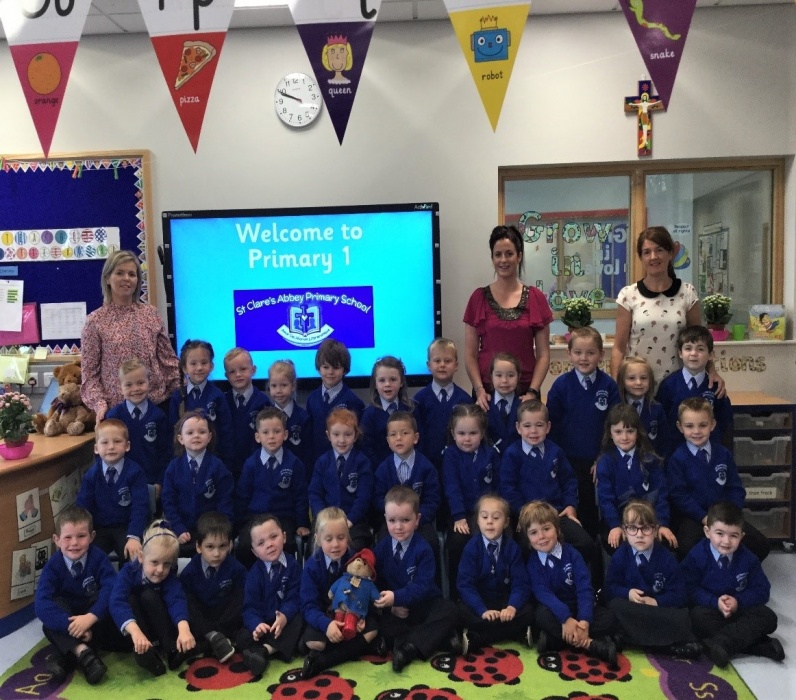
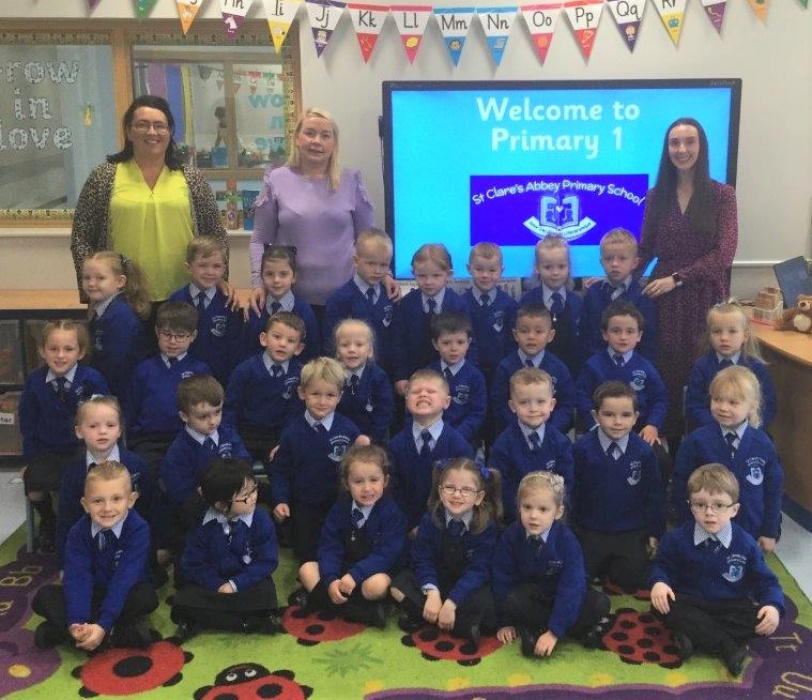
Road Safety
Article 3
All adults should do what is best for you. When
adults make decisions, they should think about
how their decisions will affect children.
Article 6
You have the right to be alive.
Article 24
You have the right to the best health care possible,
safe water to drink, nutritious food, a
clean and safe environment, and information
to help you stay well.
Cars rarely cause collisions. Roads rarely cause collisions. People cause collisions.
People who drive too fast. People who drive after drinking or taking drugs. People who drive reading and sending text messages. People who handle mobile phones whilst driving. People who drive without due care and attention and those who further endanger themselves by failing to wear their seat belt.
The number of people killed on roads across Ireland has continued on a downward trend in recent years. The determined and collaborative efforts of many individuals have helped deliver this reduction. However, it cannot be understated, one death on the roads is one too many. All deaths on our roads are unacceptable. They are unnecessary. Most of them are avoidable. That is why road safety remains a priority for parents, pupils and staff of St. Clare’s Abbey Primary School.
The boys and girls of St. Clare’s Abbey have a personal message to all road users and it is a very simple one. If everyone slowed down, did not drive after taking drink or drugs, wore a seat belt, put the mobile phone out of reach and drove with more care and attention then the number of deaths and injuries would reduce. Reducing the number of deaths and serious injuries on Ireland’s roads is an achievable objective. But it can only be delivered if we all work together.
Join us!
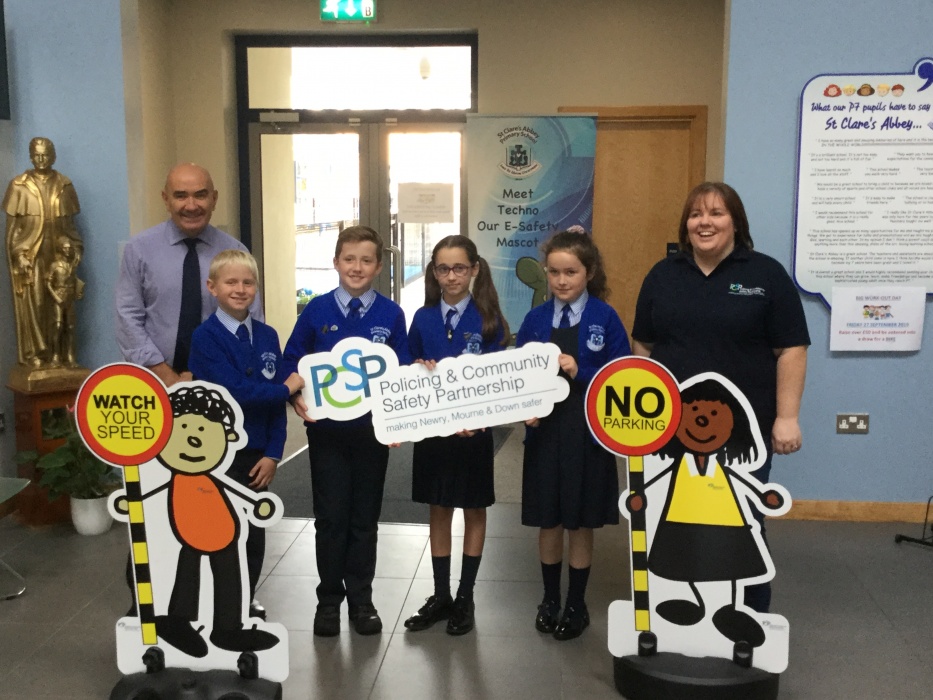
World Restart A Heart Day 2019

Article 6
You have the right to be alive.
On Wednesday 16 October 2019 the First Aiders of St. Clare’s Abbey came together along with an alliance of organizations from over the world to increase public awareness of cardiac arrests and to increase the number of people trained in life saving CPR.
Restart a Heart Day is a global initiative developed by the European Resuscitation Council, launched in 2013, to raise awareness of the importance of teaching members of the public how to help restart the heart of someone who has suffered a cardiac arrest.
Over 30,000 people suffer a cardiac arrest out of hospital every year. Currently, less than one in 10 survive. The earlier a patient can receive CPR and a shock from a defibrillator, the greater their chance of survival.
Bystander CPR increases survival by two to three times; however, it is only delivered in one in five incidents. If we achieved the same survival rates as countries like Norway (25%) – an additional 100 lives could be saved every week, the equivalent of approximately 5,000 every year. We know that the major difference is widespread training in CPR.







Firework Safety
Halloween
Article 3
All adults should do what is best for you. When
adults make decisions, they should think about
how their decisions will affect children.
Article 6
You have the right to be alive.
Article 19
You have the right to be protected from being hurt and mistreated, in body or mind.
Despite annual safety warnings, firework celebrations still end in painful injuries for too many people, including very young children. This was the message delivered by Police Constable Mary, Police Constable Christine and Fire Officer Liam to the boys and girls at our Hallowe’en Assembly.
Yet fireworks can be great fun for families, not just around Hallowe’en Night but New Year’s Eve and sometimes Birthday Parties.
Injury figures support the advice that the safest place to enjoy fireworks is at a large public display - far fewer people are injured here than at smaller family or private parties.
But if you intend having a firework party at home, you can make the occasion fun and safe for everyone by following the Firework Code, as well as some sparkler safety tips.
Only adults should deal with setting up firework displays, the lighting of fireworks and the safe disposal of fireworks once they have been used. Children and young people should be supervised, and watch and enjoy fireworks at a safe distance. Parents should follow these top tips for a safer fireworks party:
- Plan your firework display to make it safe and enjoyable
- Only buy fireworks which carry the CE mark, keep them in a closed box and use them one at a time
- Read and follow the instructions on each firework using a torch if necessary
- Light the firework at arm's length with a taper and stand well back
- Keep naked flames, including cigarettes, away from fireworks
- Never return to a firework once it has been lit
- Don't put fireworks in pockets and never throw them
- Direct any rocket fireworks well away from spectators
- Never use paraffin or petrol on a bonfire
- Make sure that the fire is out and surroundings are made safe before leaving.
- Pets often get very frightened by fireworks, so watch out for them too. You might want to keep all your pets indoors and close all the curtains.
Sparkler safety
- Never put them in your pocket
- Never pick one up off the floor
- Make sure an adult is always present
- Light them one at a time
- Wear gloves
- Hold them at arm's length
- When it goes out, put the hot end in a bucket of water. Otherwise it could still burn you.
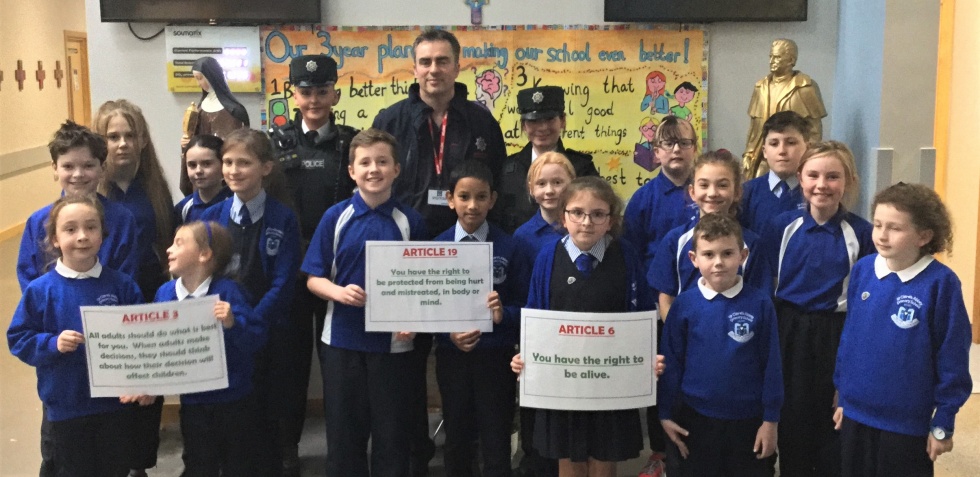
Road Safety Week
Article 19
You have the right to be protected from being hurt and mistreated, in body or mind.
As part of Road Safety Week, St Clare’s Abbey took part in a colour in competition in conjunction with Specsavers and ‘Brake’ to encourage people to ‘Step Up for Safe Streets’.
Two of our children were winners and received high visibility vests for their class from Specsavers.
School children are some of our most vulnerable road users so the vests will make our children more visible.
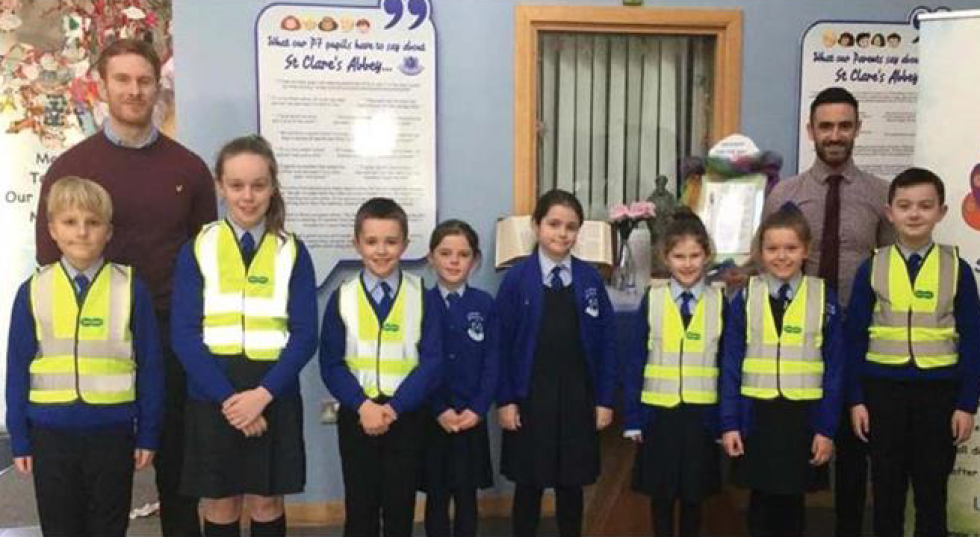
Anti Bullying Week 2019
Article 19
You have the right to be protected from being
hurt and mistreated, in body or mind.
This year's Anti-Bullying Week had the theme ‘Change Starts With Us’
and took place from Monday 11th November - Friday 15th November 2019.
Many events and lessons took place across the entire school with the aim to raise awareness that bullying is not acceptable and what measures we can take as both pupils and staff to tackle the issue! We all have a collective responsibility to stop bullying and that change starts with us!
The week culminated in an assembly led by a collaboration of the UNICEF Rights Respecting School Pupil Steering Group and Digital Leaders. The assembly gave children an opportunity to listen and learn from their peers on the various types of bullying, what pupils should do if they feel they are being bullied and what they can do to stop it. The Rights Resting Steering Group and Digital Leaders all spoke passionately and reinforced their message with two videos on Bullying.
Anti Bullying Week 2019


RR Newsletter December 2019
Guess Who Competition
Article 8
You have the right to an identity – an official
record of who you are. No one should take this
away from you
A child or young person's identity is made up of many different parts. Among other things, it includes:
- their name and nationality
- their race, culture, religion and language
- their appearance, abilities and gender
Everyone has a right to an identity. Can you guess who the members of staff are in the photographs by watching the video below.
Guess Who & Colouring Competition Winners.

Star Bakers!
Article 28
You have the right to a good quality education.
You should be encouraged to go to school to
the highest level you can.
Article 29
Your education should help you use and develop
your talents and abilities. It should also help
you learn to live peacefully, protect the environment
and respect other people.
Education can come in so many forms and Christmas is a great time to get children cooking. The food is always fun and colourful – and you can teach new skills along the way.
Children learn by touching, tasting, feeling, smelling, and listening. They love activities in the kitchen because they can use all their senses. There are many ways to get kids involved in cooking. They can help prepare food and cook.
Cooking with kids provides practical experience with many essential skills such as reading, following directions, and measuring. Getting involved in cooking helps children to develop fine motor skills, eye hand coordination, and even early concepts of math and science. There are just so many great benefits when children cook.
Baking also helps children develop motor neurone skills, listening and concentration. And it offers a chance to talk about food provenance and sustainability. We need cooks for the next generation, ones with old-fashioned, essential skills which can be applied to baking, making and concocting.
A number of boys and girls in P5 and the ECPD washed their hands, rolled up their sleeves, put on their aprons and baked the most amazing Christmas Cakes.

















Helping the Homeless and Those in Need
CHRISTMAS is the hardest time of year for people sleeping rough, with the weather getting worse every day and everyone else feeling the festive cheer. The holiday season is usually a time of celebration and of thanks for what we have and a time most of us spend with family, friends and loved ones. For those who are on the fringes of society this time of year can be a reminder of what they don't have or what they have lost which can be compounded because they are homeless.
As Christmas approaches we as a school community are very aware that 800 families in the Newry area will need help so this year we are going to help a local charity ‘The Larder Newry’ in their Christmas appeal. This is Newry's emergency food bank. It helps the needy in Newry and surrounding areas.
As a rights respecting school we are very aware of the rights of children and young people.
Article 27 states: You have the right to food, clothing, a safe place to live and to have your basic needs met. You should not be disadvantaged so that you can't do many of the things others do.
We want to help all those people in our community who, unfortunately, will not have their basic rights to shelter or food met. By gathering items for ‘The Larder Newry’ we will support a local group who do amazing work so that kids, like us, can enjoy many of the things that we take for granted.
It is particularly at times like Christmas when the Homeless and those in need require that extra bit of care and compassion to see them through. We appreciate the kindness and support of parents and pupils all year round and we are constantly blessed by their generosity in helping us fulfil our role for some of the most vulnerable in society.
Shoe Box Appeal.











Christmas Eve Mass
Article 14
You have the right to choose your own religion
and beliefs. Your parents should help you decide
what is right and wrong, and what is best for you.
Boys and Girls from our school are pictured with Archbishop Eamon Martin, Father Desmond Loughran and members of the Scouts before Christmas Eve Mass in Newry Cathedral. The boys and girls re-enacted the Nativity celebrating the birth of Jesus to a packed Cathedral.
Pope Francis wrote an apostolic letter “on the meaning and importance of the nativity scene,” in which he encourages Christians worldwide to continue “the beautiful family tradition of preparing the nativity scene in the days before Christmas” by setting up the Christmas crèche not only in their homes but also “in the workplace, in schools, hospitals, prisons and town squares.”
As we contemplate the Christmas story, he said, “we are invited to set out on a spiritual journey, drawn by the humility of the God who became man in order to encounter every man and woman. We come to realize that so great is his love for us that he became one of us, so that we in turn might become one with him.”


The Global Challenge

Our planet Earth is heating and we cannot ignore this fact anymore. Some people are in denial but not the ECO Council from St.Clare’s Abbey Primary School. They took the opportunity during Catholic School’s Week to highlight the issue of Global Warming to a huge gathering. Every year all the schools in the Diocese come together and this year they gathered in St. Therese’s Banbridge.
Planting billions of trees across the world is one of the biggest and cheapest ways of taking CO2 out of the atmosphere to tackle the climate crisis, according to scientists, who have made the first calculation of how many more trees could be planted without encroaching on crop land or urban areas.
As trees grow, they absorb and store the carbon dioxide emissions that are driving global heating. New research led by Professor Tom Crowther from the Swiss University ETH Zürich estimated that a worldwide planting programme could remove two-thirds of all the emissions from human activities that remain in the atmosphere today, a figure the scientists describe as “mind-blowing”.
They say it is overwhelmingly more powerful than all of the other climate change solutions proposed.
Professor Crowther emphasized that it remains vital to reverse the current trends of rising greenhouse gas emissions from fossil fuel burning and forest destruction, and bring them down to zero. He said this is needed to stop the climate crisis becoming even worse and because the forest restoration envisaged would take 50-100 years to have its full effect of removing 200 billion tonnes of carbon.
Our ECO Council distributed 60 trees to all the Primary Schools and Post Primary Schools in our Diocese during Catholic Schools Week. This is a wonderful start and will help reduce some Carbon Dioxide Emissions but…
We all have to do more!



St Clare's Abbey Primary School, Nursery, ECPD, 12 Courtenay Hill, Newry, BT34 2EA | T: 028 3026 2175

WEBSITE BY: SCHOOLWEBDESIGN.NET | Login




